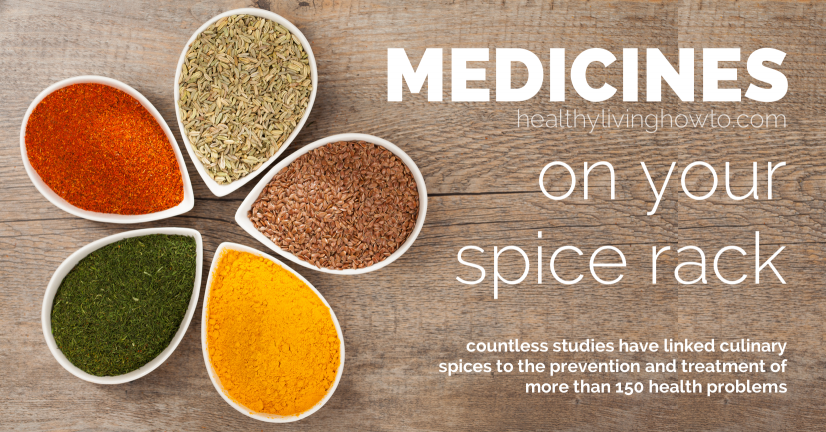The most common herbs and spices, often added to our favorite dishes for flavor, also have considerable medicinal use. It is likely, these spices and herbs were originally added to foods for this very reason. Most herbal spices aid in digestion as well as prevent and relieve gas. Spices can be used to treat problems from headaches to infection. The next time something ails you, before going to your medicine cabinet, why not give one of these remedies a try.
Medicines On Your Spice Rack
Anise is very useful for breaking up mucous and is used for hard dry coughs where expectoration is difficult. Add one cup of boiling water to three teaspoons crushed anise seeds, steep for 20 minutes.
Basil is good to use as a tea for indigestion, fevers, colds, flu, bladder troubles, headaches, nausea, vomiting and constipation. Add one ounce of basil leaves to a pint of water and simmer for 20 minutes with three black peppercorns.
Bay Leaves are too strong to use in large amounts internally, but can be added to soups and stews to improve flavor and prevent gas and indigestion. Bay oil, made by heating bay leaves with olive oil, can be used to treat arthritic aches and pains.
Caraway is an excellent digestive aid. It can be taken for indigestion, gas and colic. Let an ounce of crushed seeds soak overnight in two cups of cold water. Take in two tablespoon doses until relief is obtained.
Cardamom is good for diarrhea, colic and headaches. It is an important ingredient in Chai tea. Simmer for ten minutes, two cups water, one ounce grated fresh ginger, seven whole peppercorns, a cinnamon stick, five cloves and fifteen cardamom seeds. Add half cup almond milk or coconut milk and simmer for ten additional minutes. Add a sprinkle of nutmeg, a drop or two vanilla extract and stevia.

Cloves are effective in warming the body, increasing circulation, improving digestion, and treating flatulence, vomiting and nausea. Whole cloves may be chewed to relieve a toothache.
Cumin is one of the best spices to use to prevent and relieve gas. It is of benefit to women after childbirth to shrink the uterus and increase breast milk. To make a tea use one teaspoon crushed seeds to one cup boiled water.
Garlic is a well-known cure-all home remedy. It is used in the treatment for high and low blood pressure, headaches, infections and anxiety. For high blood pressure eat one clove of garlic a day.
Ginger is of great benefit to the stomach, intestines and circulation. Ginger tea is an excellent treatment for colds and flu. Simmer for ten minutes two cups of water with one ounce fresh grated ginger.
Rosemary contains compounds that are useful for stimulating the immune system, increasing circulation and improving digestion. Rosemary tea is great at treating and relieving headaches. Steep covered, half an ounce of rosemary with two cups boiling water.
Stevia is a herb that is anywhere from 10 to 300 times sweeter than sugar. It has a long history of use in South America in the treatment of diabetes and reducing blood glucose levels. The extract can be used in cooking and baking and as a sweetener for herbal extracts and teas.
Thyme is used for bronchial problems, whopping cough and laryngitis. An ounce of the herb is steeped in two cups water then strained and sweetened. One ounce is an adequate daily dose. It can be used as a mouthwash as well.
Turmeric is a blood purifier and can be applied externally and internally to heal wounds. It is very beneficial to circulation and helps regulate the menstrual cycle and alleviate menstrual cramps. Add a teaspoon of turmeric, along with a teaspoon of almond oil to a cup of warm almond milk.
Resources: The Way of Herbs and Healing Spices
